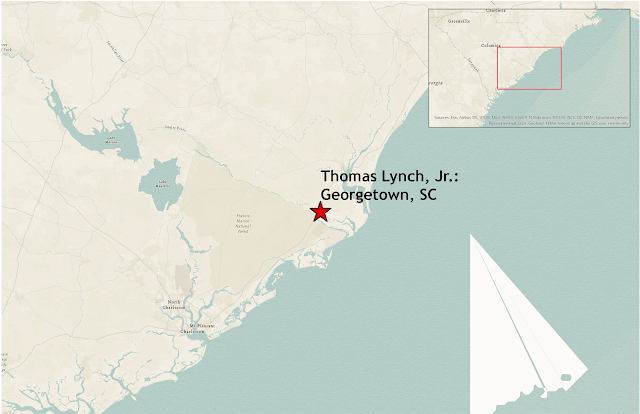Founding Fathers - Thomas Lynch, Jr.
Thomas Lynch, Jr.
Born: August 5, 1749 (near Georgetown, South Carolina)
Died: 1779 (at sea)
Our final "Junior" of June is also the first of the group who bore the same first name as his father. Born at his family's plantation named Hopsewee along the northern bank of the North Santee River, just south of Georgetown, SC, Thomas Lynch, Jr. was the third child and only son born to Thomas and Elizabeth Lynch. In fact, the young man's grandfather had also been named Thomas, and all three men would eventually serve South Carolina in political positions, with the elder two both holding seats in the Royal Assembly. The younger Thomas began his education at Georgetown's Indigo Society School before being sent to England to get a more complete education. He earned honors at both Eton College and at Cambridge before studying law at Middle Temple, where all four of South Carolina's signers had attended. He would not pursue a legal career, however, and upon his return home from Europe in 1772 he established himself as a rice planter at Peach Tree Plantation, which sat just south of the Santee River from his childhood home.
On May 13, 1772, Thomas Lynch, Jr. married Elizabeth Shubrick, whom he had known since childhood. Apparently the Shubrick family had an affinity for influential revolutionaries, as Elizabeth had two sisters who also married into the families of Declaration signers: Mary Shubrick married Edward Rutledge and Hannah Shubrick married the brother of Thomas Heyward, Jr. While Lynch's father approved of his decision to not pursue law, he encouraged his son to involve himself in politics. Lynch believed that South Carolina should form their own government independent of the British, whose opinion of the colonists he found distasteful during his time in London, and his outspoken criticism of the Crown made him popular with local Patriots. He was selected to the first Provincial Congress in 1774, and during his two years of service he served on a committee that wrote a state constitution. He was named a captain of South Carolina's militia in 1775, but while on a recruiting trip to North Carolina he contracted a debilitating fever that would prevent him from serving.
While Thomas Lynch, Jr. was serving the cause of independence in South Carolina, his father had been sent to Philadelphia as a delegate to the Continental Congress. The elder Lynch had a stroke in early 1776, and his son was quickly chosen to replace him. At just 26 years of age, Lynch became the second-youngest delegate (3 months older than his brother-in-law, Edward Rutledge) and part of the only father-son duo to participate. Despite still suffering from his own illness, the younger Lynch was able to vote for and sign the Declaration. The South Carolina delegates left a space for the elder Lynch to place his name in the hopes that he would recover, but as 1776 neared its end the pair were both suffering greatly from their illnesses and, unable to continue serving, they left Philadelphia before he had the chance. Thomas Lynch, Sr. died along their way and was buried in Annapolis, Maryland. The son returned home to Peach Tree Plantation in hopes of recovering, but after more than two years was still dealing with the fever's lingering effects. Doctors suggested Lynch travel to southern France for a change in environment, and despite the hazards of a wartime journey he and Elizabeth boarded a ship bound for the West Indies in late 1779. The boat never made it to its destination and no trace of it was ever found, so all passengers were presumed lost at sea near the infamous Bermuda Triangle. Thomas Lynch, Jr. died at just 30 years of age, the youngest of any signer of the Declaration of Independence.
The signature of Thomas Lynch, Jr. can be found as the sixth name in the second column beneath the Declaration of Independence.



Comments
Post a Comment